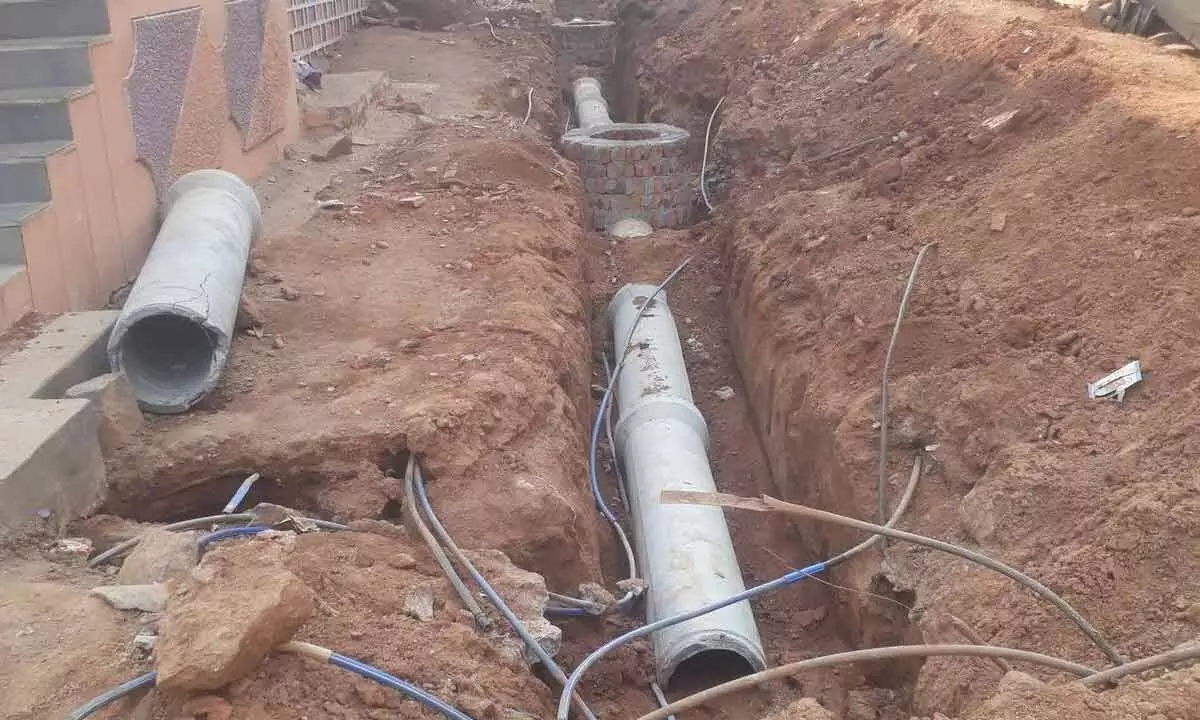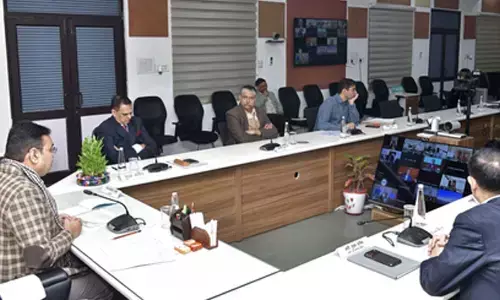Hyderabad: Dejected residents building roads and sewerage voluntarily in Jalpally

Dejected residents building roads and sewerage voluntarily in Jalpally
- Blaming the municipality for their hardship, people in several wards buying pipes on their own to build filth flowing system
- Spread over an area of 30 square kilometres on the city outskirts, the Jalpally municipality is known as a densely populated and poorly developed Urban Local Body (ULB) in the Maheshwaram constituency represented by MLA P. Sabita Indra Reddy, who is also a Minister of Education
Rangareddy: Having been disappointed with the reported lukewarm representations of the local councillors and, most importantly, municipal authorities depriving them of basic amenities, the people with common consent in different wards of the Jalpally municipality are equipping themselves with facilities like pliable roads and underground sewerage lines in their colonies with money contribution.
Spread over an area of 30 square kilometres on the city outskirts, the Jalpally municipality is known as a densely populated and poorly developed Urban Local Body (ULB) in the Maheshwaram constituency represented by MLA P.Sabita Indra Reddy, who is also a Minister of Education.
In this municipality, people in several wards found building facilities like roads, sewerage etc., on their own, reportedly after getting disappointed over the municipalauthorities turning a blind eye towards their grievances. Unmetalled roads, lack of sewerage lines, and water supply, besides no proper sanitation are the issues making people obnoxious against the municipality officials and the concerned representatives.
"Upon realising that all the requests and representations to local councillors and municipal officials are yielding no results and that our grievances are not being addressed, we have decided to take up building sewerage line on our own in our colony, contributing the money equally," informed Sayeed Bin Ibrahim, a resident of Abubakar Colony, in Ward No.2, under Jalpally municipality.
"We purchased around 47 pipes spending 1.5 lakhs collected from all the nine families living in the street," he said, adding that, "Each family extended a share contribution of Rs.16,500,which translates into Rs.1,48,500. Apart from this, 50 trucks of earthen material were dumped before laying the sewerage pipes to flatten the potholes ridden street."
With an estimated population of over 112 lakh people, this municipality was divided into 28 wards having abode to 30,425 families, mainly settlers from neighbouring states like Maharashtra and Karnataka, besides neighbouring districts.
Despite being located close to the city starting from Chandrayangutta area, this municipality comes under Rangareddy district but is considered the most neglected area in all the 16 Urban Local Bodies (ULBs) of the district in terms of basic amenities like proper roads, sewerage lines, sanitation and healthcare facilities.
It is said that the same Abubakar Colony has two more similar streets where the local people build theirsewerage system by sharing the money equally.
Apart from this, an open nala passing through ward number 26 in Errakunta was also turned into a box drain by the local people who were worried over the regular mosquito menace.
"The local people purchased the extra size sewerage pipes and built an underground system to allow filth to pass through the pipes instead of flowing openly, which they blame is often causing stink and breathing issues for the locals," said Samad Bin Siddiq, a social activist of the area.
The residents, in different wards of the Jalpally, are bringing sewerage pipes as per their capacity and building their filth-flowing system regardless of the scientific and geographic impacts, and more so, without the interruption of the municipality. According to engineering experts, the present trend being witnessed in Jalpally may later create a more chaotic situation if the water bodies nestled around the habitations go haywire especially in the rainy season.

















